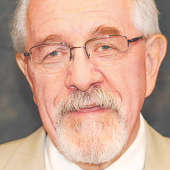- Christmas shopping is done, presents wrapped, strings attached? (12/14/16)
- Cecil is dead and human lives are threatened every day (8/12/15)
- As state flags go, Nebraska's ranks 50th (7/8/15)
- When everything looks like a nail (4/29/15)
- Who remembers to coal slurry pipeline debate? (3/11/15)
- More revelations in Department of Corrections mess (12/17/14)
- The Legislature becomes more Republican (11/19/14)
Opinion
Lessons to be learned from botched execution
Wednesday, June 4, 2014
Count me among those people who have changed their mind about the death penalty.
Sure, the recent bungled execution of Clayton Lockett in Oklahoma had something to do with it. Sure, listening - repeatedly - to the arguments against the death penalty by Senator Ernie Chambers of Omaha had something to do with it.
Sitting through two days of Pardon's Board testimony about Willy Otey in the summer of 1994 had something to do with it. He was executed. Spending time at the Governor's Mansion with Ben Nelson and a couple reporters in July 1996 awaiting word that John Joubert had been executed played a part.
Narrowly missing an assignment to witness the execution of Robert E. Williams in December 1997 and report my observations to the world had a giant impact. But having my first-born son incarcerated for three years, and the in-depth look at the criminal justice system that gave me, probably turned the corner for me.
Researching the death penalty in Nebraska about a year ago gave me the final push when I ran across the story about the hanging death of William Jackson Marion back in 1887. He was convicted and executed for the murder of John Cameron. However, Cameron turned up alive in 1891. Marion received a posthumous pardon by Nebraska Governor Bob Kerrey on the 100th anniversary of his execution.
You don't have to be a reporter to pause and wonder if Marion was the first and only mistake in Nebraska among the 37 executions in Nebraska's history and how many others there might be in a year in the United States. But when you get to know the system, you understand that we are all humans, and humans make mistakes.
I reported on the crimes and the trials and the convictions and the executions of the last three in the '90s. I know that the bodies of the victims were found. We can assume, based on extensive reporting, that the same holds true for the 11 men currently on death row.
In 2008, the Supreme Court ruled that death by electrocution in Nebraska was cruel and unusual punishment. The Legislature approved death by lethal injection in 2009. Capital punishment remains on the books in Nebraska, but the supply of the execution drug sodium thiopental ran out in December. The drug is nearly impossible to buy because like most drugs used in executions, it's produced by European-based companies that are prohibited from exporting drugs used for capital punishment.
There are those, some of them death penalty proponents, who believe that there will never be another execution in Nebraska. While they believe the punishment is appropriate for the most heinous crimes, they understand that the constant legal challenges to the method and the appeals process for the convictions are just too costly.
Couple that with the fact that government has yet to prove that it's up to the task of administering the death penalty fairly and constitutionally, and one can make a strong case for locking them up and throwing away the key.
Gov. Dave Heineman has said that the botched Oklahoma execution was unfortunate but threatened to overshadow the woman who was murdered.
Chambers has fought for decades to abolish the death penalty. Lawmakers passed his repeal in 1979, but then-Governor Charles Thone vetoed it. A similar proposal didn't get past first-round debate this year.
Life in prison without parole would limit the length and expense of the appeals and remove the false hope of victim's families. It would also take the pressure off a system that struggles, at best, to do some things right. In the end, life in prison without parole is probably the most humane for all concerned.

